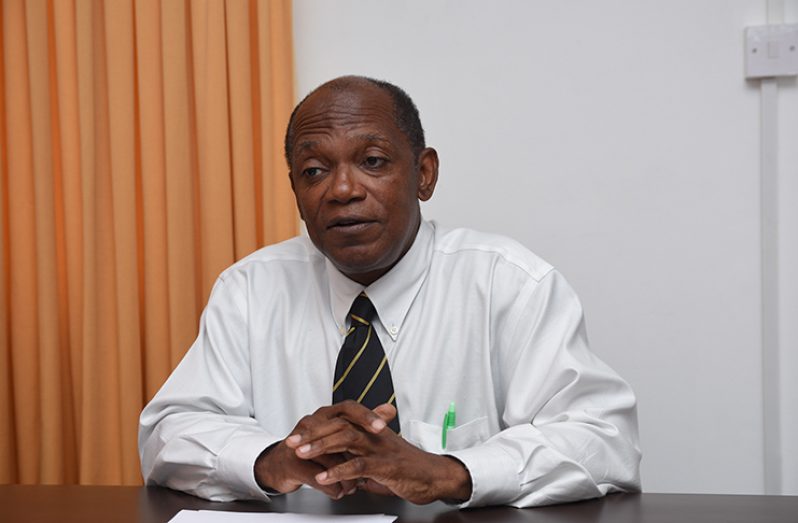Emancipation is a celebration for all
LIBERATION
EMANCIPATION Day, originally termed as ‘Freedom Day’ in Guyana is not an “African holiday” but rather one to be celebrated by all six races as it paved the way for not only one, but all peoples of Guyana to be free.
This is the firm position of African Cultural and Development Association (ACDA) Executive, Eric Phillips, who sat down with the Pepperpot Magazine for an interview ahead of the much-anticipated August 1, celebration.
When freedom came to Guyana for the first time in 1838 after over 200 years of enslavement, Phillips said that this created a path for the same freedom to be assumed to the various ethnic groups which came after.
He believes that had it not been for emancipation, Guyana would have been a nation of three peoples instead of six.
“Freedom is very important to African Guyanese. It’s very important to the nation as a whole because with emancipation all other peoples came here free.
“The Portuguese who came after in 1834, they came a freed people while the Indians who came in 1838 came as freed people, the Chinese who came here in 1853 came as freed people but had it not been for Emancipation they would not only not be here but Guyana would be a different country [than] it is today,” he positioned.
This is why the African activist believes that Freedom Day is the most significant holiday in Guyana and should begin to be perceived as such.
However, he pointed out that many Guyanese still seem to have the misguided perception that there is some exclusivity of the celebration to Afro-Guyanese.
“We still seem to have an ethnic slant because it is called Emancipation Day and because emancipation is perceived as being just for African Guyanese but emancipation is the day that created a modern Guyana,” he said.
Phillips nonetheless understands the special sacredness that many Africans place to the day both then and now.
He reminded that it was the Emancipation Act, passed in the British Parliament, which made Africans no longer objects or chattel, but human beings, although they were always human and free, to begin with.
“Africans are more focused on Emancipation Day as a day of freedom and that’s because they were enslaved for over 200 years. Whereas, others who are here didn’t come here as slaves, so they don’t feel it,” he explained.
Phillips said that it is out of such disadvantages and many others in the past and present which led to negatives such as racism, self-hatred within the African-Guyanese community and other forms of ‘mental slavery’.
“That created a stigma in the African community where people have been taught white is right…[still today], African Guyanese feel uncertain of themselves, they feel uncertain of their identity because the society is still very hierarchal,” he said.
But Phillips reminded that Africans have been on this earth for over three million years contributing many firsts in Infrastructure, Medicine, Mathematics, Science, Agriculture, Technology, Art and more, but many of these are not being taught today.
“A lot of African Guyanese believe that their history started with slavery which is only a small window in our entire lifespan…we don’t tell people that Africans built Guyana; that 475,000 Africans died to build Guyana; that we move 100 million tons of earth to build Guyana; that we cleared nine million acres of land to build Guyana. No one tells us that.”
ECONOMIC INCLUSION
Speaking on behalf of the Afro-centered organisations he represents, Phillips said that, in Guyana they are calling for economic inclusion, cultural respect and a political system which includes everyone.
These include calls for reparations in the form of 18 per cent of Guyana which translates to the 15,000 square miles cleared by Africans; equal access to procurement and all of Guyana’s resources; a bank for African Guyanese and for African history to be better taught in schools.
Phillips, who also serves as the President of the African Business Roundtable (ABR), touched on the current banking system and some disadvantages that arise. He stated that the six banks existing in Guyana are all owned by non- Africans and many times Afro-Guyanese business ventures are overlooked.
“You can’t build a society without having access to capital and what we are finding is that many of our African Guyanese go to banks with projects that are good projects, that get rejected and yet we see those projects being financed for other groups,” he said.
CULTURAL CELEBRATIONS
Phillips also said that cultural celebrations such as soiree, kwe kwe (queh queh) and libations, too, deserve to be honoured and not deemed as ‘obeah’ or any other form of negatives.
“The Indians go to the river and plant flags and all of that and that’s a part of their culture. We go and do libations and they [generally speaking] call it obeah…Libation is a way of giving thanks to your ancestors, of saying thank you for being the shoulders on which we stood, it’s acknowledging our heritage,” he corrected.
Phillips reiterated, then, that Emancipation Day, to him, is the most important holiday in Guyana because it marked the beginning of a nation of free people.
“Culture and identity are interlinked. We have a Guyanese culture that is still evolving and our Guyanese culture will be a blend of six cultures because there are six races, six ethnicities. Emancipation is the unifying element of Guyana because without emancipation other races wouldn’t be here,” he said. “So, Emancipation should be celebrated by all races. Emancipation should be every body’s business because emancipation is also about freedom. Emancipation was about rights, about everyone getting their human rights. So if you believe in human rights and that all people are equal, then you will believe in emancipation and celebrate emancipation because that was the single most important occurrence in Guyanese history that made everyone free.”



.jpg)











